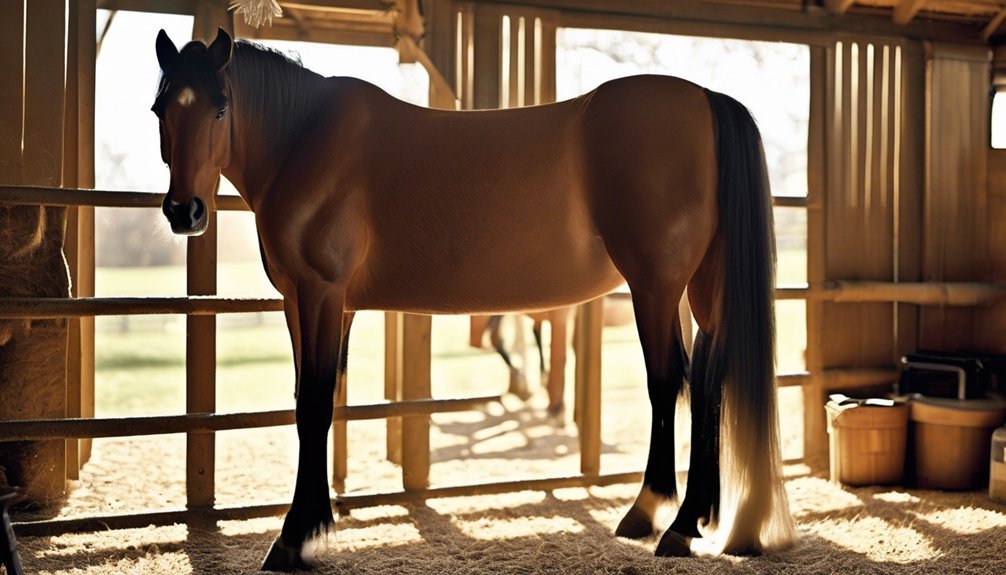
Did you know that around 20% of horses have sensitive skin, making grooming a delicate task? If you're one of the many horse owners facing this challenge, it's crucial to adopt gentle techniques and select appropriate tools. Understanding how to cater to their needs can significantly improve their comfort and skin health. Let's explore effective strategies to ensure your sensitive-skinned horse enjoys a soothing grooming experience.
Key Takeaways
- Use soft-bristled brushes and rubber curry combs to ensure gentle grooming that minimizes irritation on sensitive skin.
- Always choose hypoallergenic grooming products with natural ingredients to reduce the risk of allergic reactions.
- Monitor your horse for signs of skin irritation, such as redness or scratching, and adjust grooming techniques accordingly.
- Employ light pressure and circular motions to alleviate tension while grooming sensitive areas, ensuring comfort for your horse.
- Incorporate calming words and a soothing atmosphere during grooming sessions to enhance the overall experience for your horse.
Understanding Sensitive Skin in Horses

When you're grooming your horse, it's crucial to understand that many horses have sensitive skin that can react to different grooming methods and products.
To ensure effective skin care, start by observing your horse's reactions during grooming. If you notice flinching or irritation, it's a sign you need to adjust your approach.
Always choose gentle, hypoallergenic products to minimize the risk of allergic reactions. Regularly check for signs of skin issues, such as redness or bumps, which may require allergy management strategies.
Incorporating soothing balms can help alleviate discomfort and promote healthy skin.
Choosing the Right Grooming Tools
Choosing the right grooming tools is essential for maintaining your horse's health and comfort, as improper tools can lead to irritation or ineffective grooming.
When you select grooming tools, consider both the brush materials and tool ergonomics to ensure a gentle touch.
- Soft-bristled brushes: Opt for brushes made of natural fibers like horsehair, which are gentle on sensitive skin and effective in removing dirt.
- Rubber curry combs: These help stimulate the skin without causing discomfort, promoting circulation while loosening debris.
- Ergonomically designed handles: Look for tools that fit comfortably in your hand, reducing strain and allowing for better control during grooming sessions.
Investing in the right tools shows your love and care for your horse's well-being.
Techniques for Gentle Grooming

Gentle grooming techniques are vital for ensuring your horse feels relaxed and comfortable during the process.
Start with gentle brushing using soft-bristled brushes that glide effortlessly over sensitive skin. Always brush in the direction of hair growth, applying light pressure to avoid discomfort.
Incorporate soothing techniques like circular motions with your fingertips along your horse's neck and shoulders, which can help relieve tension and build trust. Pay attention to areas your horse may be sensitive about, and adjust your approach accordingly.
Use calm, reassuring words to create a peaceful atmosphere. Remember, your touch can make all the difference, fostering a bond that enhances both grooming and your horse's overall well-being.
Always be patient and attentive to your horse's reactions.
Selecting Horse-Friendly Grooming Products
As you select grooming products for your horse, it's essential to prioritize their safety and comfort. Opting for the right items can make a significant difference, especially for those with sensitive skin.
Here are three key considerations:
- Natural Ingredients: Look for products with plant-based components. They're gentler on the skin and less likely to cause irritation.
- Hypoallergenic Options: Choose grooming items specifically labeled as hypoallergenic. These products minimize the risk of allergic reactions and ensure a soothing experience.
- Gentle Formulations: Avoid harsh chemicals and synthetic fragrances. Instead, seek out soothing creams or sprays that nourish the skin.
Your horse deserves the best, and selecting the right grooming products is a vital step in ensuring their well-being.
Establishing a Routine for Sensitive Horses

When you have a sensitive horse, establishing a consistent grooming routine can significantly enhance their comfort and overall well-being. Creating a structured grooming schedule not only builds trust but also helps you monitor their skin condition closely. Incorporate daily rituals that focus on gentle brushing, checking for irritations, and using soothing products.
Here's a simple table to help you plan:
| Day | Grooming Activity | Notes |
|---|---|---|
| Monday | Brush & Check | Use a soft brush |
| Tuesday | Bath Day | Use hypoallergenic shampoo |
| Wednesday | Massage & Groom | Focus on sensitive areas |
| Thursday | Brush & Check | Look for any changes |
Recognizing Signs of Skin Irritation
While establishing a grooming routine for your sensitive horse, it's vital to stay vigilant for signs of skin irritation. Recognizing these signs early can prevent discomfort and further complications.
Here are three common indicators to watch for:
- Red or Inflamed Skin: Any unusual redness or swelling can signal irritation.
- Excessive Scratching or Biting: If your horse is frequently scratching or biting at a specific area, it's likely experiencing discomfort.
- Hair Loss or Scabs: Patches of hair loss or the presence of scabs often indicate skin irritation caused by allergens or parasites.
Understanding these common causes can help you better care for your horse. By paying attention to these signs, you can ensure your horse remains comfortable and healthy.
Additional Care Tips for Sensitive Skin

Caring for a horse with sensitive skin requires a thoughtful approach to ensure their comfort and well-being.
Start by evaluating their dietary considerations; a balanced diet rich in omega fatty acids can improve skin health. Always consult your vet to determine any necessary supplements.
Environmental factors also play a significant role—maintaining a clean, dry living area minimizes irritants. Regularly check for allergens like pollen or mold in their environment, and consider using fly sheets to protect against insects.
When bathing, use gentle, hypoallergenic shampoos and make sure to rinse thoroughly.
Lastly, monitor their skin closely, and don't hesitate to reach out to your vet if you notice any changes. Your attentiveness makes all the difference!
Frequently Asked Questions
Can Diet Affect My Horse's Sensitive Skin Condition?
Absolutely, your horse's diet can significantly impact their sensitive skin. Nutritional supplements might help alleviate skin allergies, promoting overall health. You'll want to consult a vet to tailor the right diet for their needs.
How Often Should I Bathe a Horse With Sensitive Skin?
You should bathe your horse with sensitive skin sparingly, ideally every few weeks. Choose a gentle, hypoallergenic shampoo to prevent irritation. Frequent bathing can strip natural oils, so balance is key for their comfort.
Are There Specific Breeds Prone to Sensitive Skin?
Sensitive skin's certainly a concern, especially for specific breeds like Arabians and Thoroughbreds. These horses often face skin conditions, so it's vital to monitor their skin health closely and provide gentle care to ensure comfort.
What Environmental Factors Worsen Sensitive Skin in Horses?
Humidity levels and increased UV exposure can exacerbate your horse's sensitive skin. When conditions change, it's essential to monitor your horse closely, ensuring you provide a comfortable environment that promotes their well-being and protects their skin.
Can Stress Impact My Horse's Skin Sensitivity?
Yes, stress triggers can significantly impact your horse's skin sensitivity. When anxious, your horse may experience heightened skin reactions, leading to irritation. It's essential to maintain a calm environment to help soothe and protect your sensitive companion.
Conclusion
In conclusion, grooming horses with sensitive skin doesn't have to be daunting. By using the right tools and techniques, you can keep your horse comfortable and happy. Did you know that nearly 20% of horses experience skin sensitivities at some point in their lives? By establishing a gentle grooming routine and monitoring for irritation, you can help your horse thrive. Remember, a little extra care goes a long way in ensuring their skin health and overall well-being.





